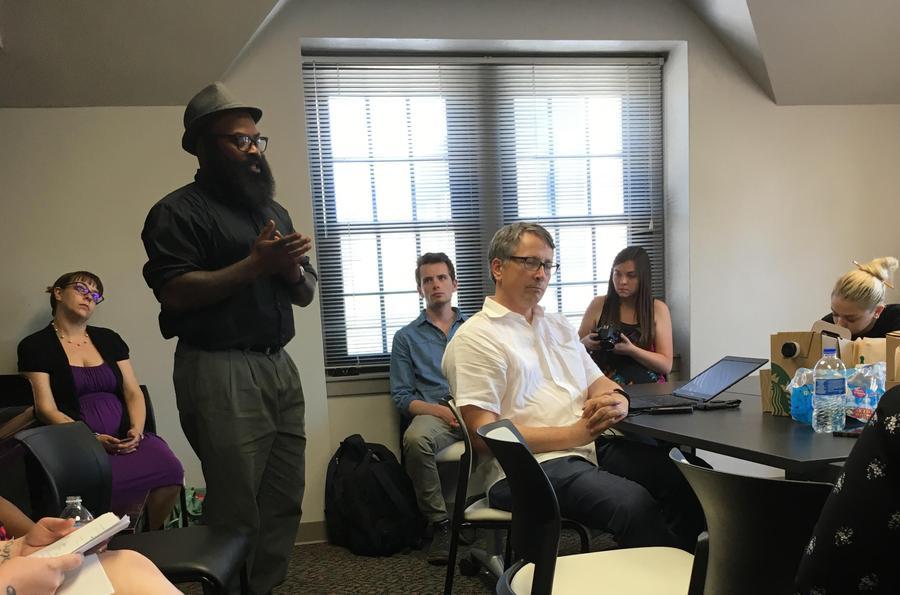In response to the news that former St. Louis police officer Jason Stockley was found not guilty of first-degree murder and armed criminal action in the shooting death of Anthony Lamar Smith after a police chase, the MU Black Studies Department hosted an open forum at Gentry Hall on Friday at 1 p.m.
The forum featured testimonies and personal experiences from undergraduate students, graduate students and faculty. Toward the end of the discussion, the floor opened up to ideas regarding further action on improving campus culture.
Political science professor Stephen Graves explained the details of the case during the meeting for those unfamiliar.
In 2011, Smith was involved in a police chase after a suspected heroin deal. Stockley was in pursuit of Smith when he crashed his police vehicle into Smith’s vehicle. Once he approached the wreck, Stockley pulled out his gun on Smith.
Stockley said he believed Smith had been reaching for a handgun in his vehicle. In response, Stockley shot Smith in the chest five to six times at close range, killing him.
On May 30, 2012, Stockley was interviewed by the FBI, when he officially stated that he felt threatened by Smith.
“We hear this every single time: The cop was feeling threatened, the suspect appeared to reach for something,” Graves said. “Even when they’re not reaching for something there’s still some immediate threat.”
Stockley was officially charged with Smith’s murder on Aug. 8, 2016. After Friday afternoon’s acquittal, various protests erupted across St. Louis.
At MU, black students and allies expressed their response to the verdict and discussed ways to improve the greater community. Stephanie Shonekan, chair of the Black Studies Department and professor of ethnomusicology, led the discussion and emphasized the different resources that students affected by current events can utilize.
One of these resources, led by graduate student Oscar Rojas Perez, is a weekly counseling group that calls for addressing racial injustice; it meets every Friday at 2 p.m. in the Multicultural Center. Students will soon have the opportunity to get involved in a new initiative that also focuses on discussion, which will meet Mondays at 3:30 p.m.
In addition, the attendees proposed an idea of a mapping project that would involve a visual representation of “safe spaces” around campus and in the surrounding downtown area. The group felt that a map would be beneficial to MU students, especially freshmen who aren’t familiar with the area.
Olivia Mcgee was one of those freshmen. Mcgee felt isolated when she first arrived at MU and faced difficulties as a black student, she said.
“I knew coming into Mizzou a little bit about the history, having family members who had been here before,” she said. “The first thing they told me to do was to go to the [Black] Culture Center and find black groups to join.”
Since arriving on campus, Mcgee has joined MU’s chapter of the National Association of Black Journalists. She said having the opportunity to meet other black people on campus helped her to adjust to the environment.
During the meeting, white students and faculty expressed their support for the black community. Missouri Students Association Senator Aleksander Shanks wanted to know what he “can do to help [his] fellow students while also getting other organizations involved.”
Ryan Gavin, strategic communications manager of the Division of Diversity, Inclusion and Equity said that as a white male, he’s more privileged and wants to see how he can help the community and affect positive change. He and other attendees at the meeting believed “ally [support] with the black community is a key step in making progress.”
Aaric Doyle-Wright, office support assistant for the Division of Inclusion, Diversity and Equity, would love to see more student allies on campus who aren’t “stepping on the voices of the marginalized.” Instead, more student allies should allow black students to speak for themselves about their experiences, he said.
Along with being an ally, the attendees decided that an increase in awareness of racial injustice would benefit MU.
“The awareness piece is crucial. We need to create more [safe] spaces like this,” Doyle-Wright said. “We need to have higher ups talking about ally-ships for people who’re being directly and indirectly traumatized.”
Involvement from the administration was a primary goal of the meeting. Shonekan said she wanted the messages in the room to “trickle up all the way to the chancellor.”
Chancellor Alexander Cartwright sent an email to students Friday.
“The University supports every individual’s right to express personal opinions and feelings in a peaceful manner,” Cartwright said in the email. “Our values of Respect, Responsibility, Discovery and Excellence guide all of us, and we remain committed to free expression, but that expression must be shared in a peaceful manner.”
Graves hopes that by having the administration recognize how the issue is impacting MU students, the university will be able to move forward. The Stockley-Smith case has a severe impact on the campus as a whole, Graves said.
“The shock value continues to be diminishing and diminishing as more of these things come up,” he said. “We’re no longer being surprised by violence and that’s disheartening and discomforting. When people aren’t being shocked by injustice anymore, people are becoming numb to it, and that’s essentially a problem.”
_Edited by Olivia Garrett | [email protected]_














